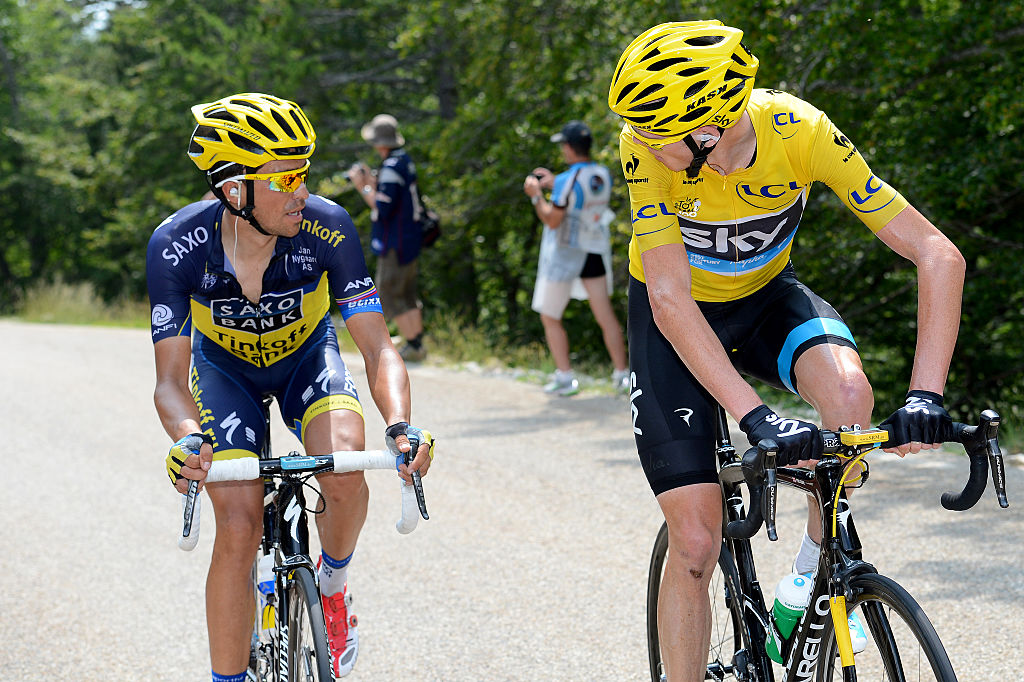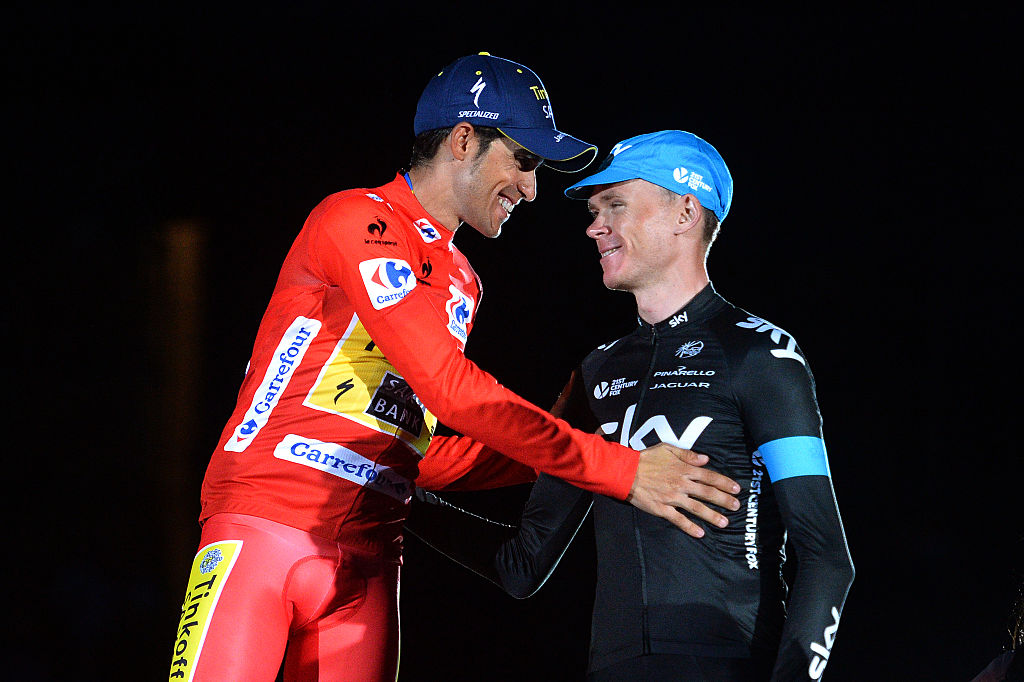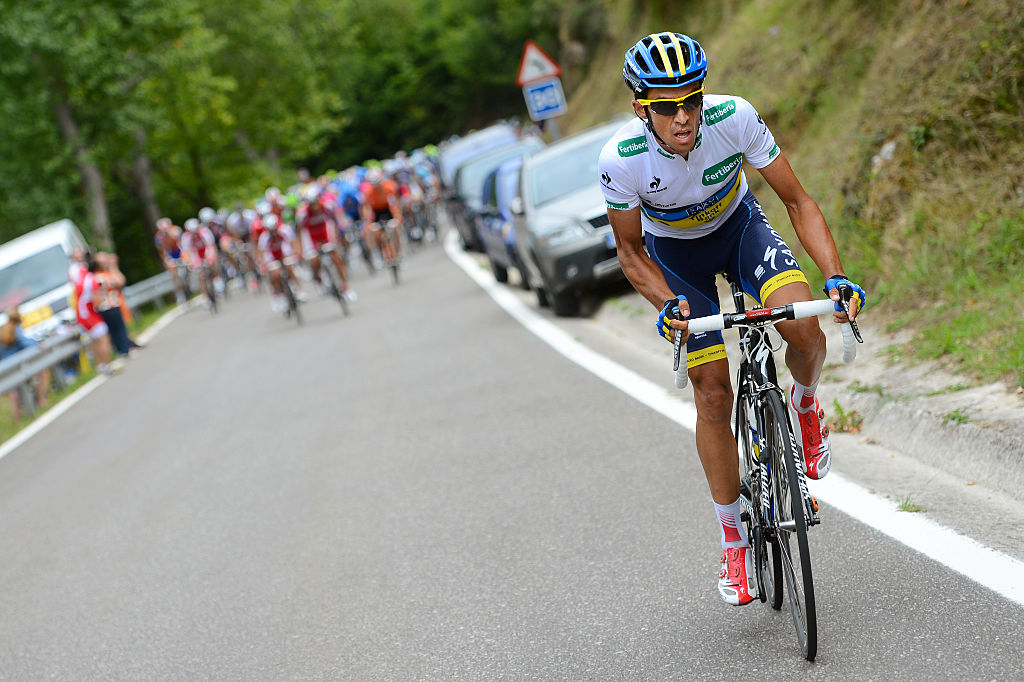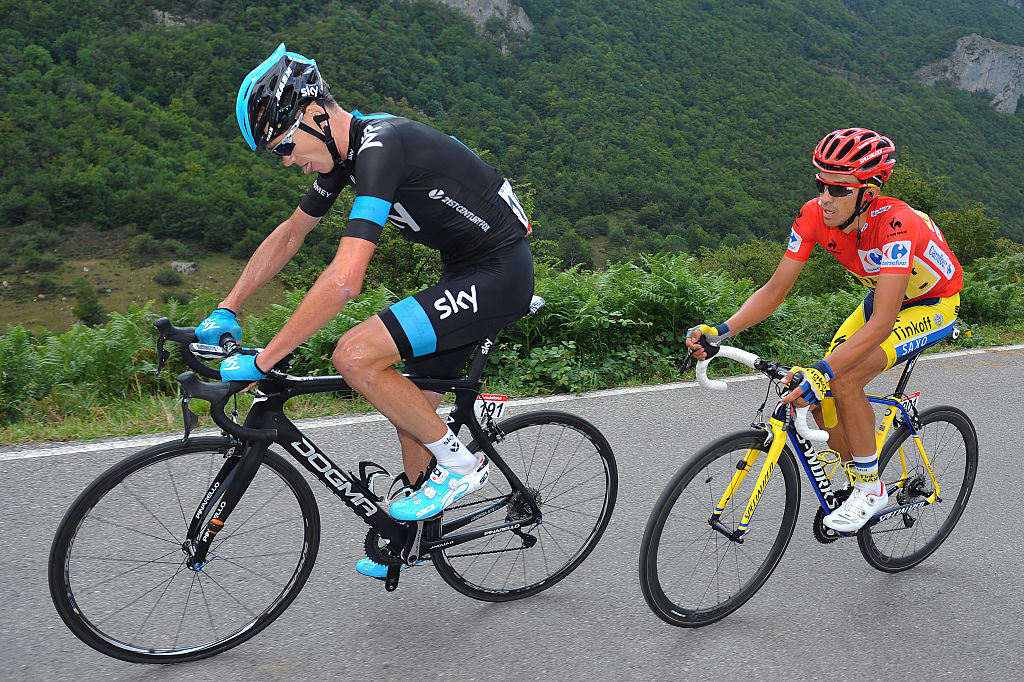Alberto Contador and Chris Froome: Clash of the titans
Spaniard talks to Procycling about the rivalry, why Froome is so strong, and why power meters should be banned

Speaking to Procycling magazine for its January issue, seven-time Grand Tour winner Alberto Contador reflects on one of his greatest rivals: Chris Froome.
The pair did battle at four editions of the Tour de France and four editions of the Vuelta a España between Froome's emergence in 2011 and Contador's retirement in 2017, winning six of them along the way. In a wide-ranging interview, Contador talks about 'the Sky method', his famous win at Fuente Dé, and how racing has changed over the years, among other things.
The January edition of Procycling is out now.
Procycling: What people remember the most about you is how you fought against Chris Froome...
Alberto Contador: To be honest, I fought more against a team than an individual. I fought more against Sky than Froome, unlike when I was battling, say, against Andy Schleck. It was me fighting against their philosophy of racing. Sky's way of racing forced me to change my training methods; from 2014 I started training at altitude and I got a lot of wins that year.
PC: Do you think the fact that Sky had so many financial resources gave them an unfair advantage?
AC: One thing is undeniable: this is the same situation as Barcelona or Real Madrid in football. The more money you have, the higher the quality of riders you can buy. It doesn't just depend on that. You've got to have the resources and the right preparation. But if you can put in eight top-level riders for the Dauphiné and eight top-level riders in the Tour de Suisse at the same time, you will have a line-up for the Tour that’s absolutely outstanding and even be leaving a large number of amazing riders on the bench. Other teams struggle to find eight great names for the Tour and maybe include one or two run-of-the-mill riders just to make up the numbers.
The latest race content, interviews, features, reviews and expert buying guides, direct to your inbox!
PC: And if you could have signed one Sky 'support' rider from Froome, who would it have been?
AC: [Thinks for a long time] Richie Porte. When he was in Sky there were days he was going better than Froome. Wout Poels is another one, and there are so many in Sky – Michał Kwiatkowski, Geraint Thomas – but I’d sign Porte.

PC: Would you agree that when Sky have been on the back foot, their weakest point has been strategic rather than physical? Like when Froome was caught out in the 2013 Tour in the Pyrenees or during your attack at Formigal in the 2016 Vuelta?
AC: I think Sky’s biggest handicap was that initially their knowledge of racing successfully was based on what the British had done on the track. They lacked tactical knowhow for road racing scenarios, and sometimes the gaps in that knowledge remained unplugged for a very long time – years, even.
Of course, they had some riders who were old hands at road racing, but some of them were not so experienced. With time, they’ve gradually covered those gaps and it's now very rare for Ineos to get caught out. Another weak point of Froome's is the cold. But he's been a rider who's mainly targeted the Tour, where it’s nearly always hot, and that's been to his advantage.
PC: When Froome’s in difficulty, is there anything that tells you he’s on the back foot, or vulnerable?
AC: No. In that particular area, Froome is one of the strangest riders I've ever come across. When he is going up a climb, often he gets dropped early on but, little by little, he fights back. I remember in Ancares in the Vuelta in 2014, Joaquim Rodríguez attacked, then Alejandro Valverde went for it and I opted to stay with Chris as he fell back behind. First we caught Purito [Rodríguez], then we caught Valverde and a kilometre from the top, I attacked and I could win. It's a very different style to mine, but obviously it gave him some excellent results.
I remember in the 2013 Tour or Dauphiné I'd attack because I thought he was having an off-day and then he'd end up catching me and dropping me. The first time he did that to me I wasn't so upset, but the second time he turned the tables on me again, I told myself not to fall into the same trap.
The Contador method
PC: People tend to distinguish between the 'Team Sky method' and the 'Alberto Contador method' by saying Sky raced a lot with their heads and you raced a lot with your heart. But what you might call your comeback win after your ban, at Fuente Dé in the 2012 Vuelta a España, was a victory where strategy mattered a great deal and you used your team-mates like Sergio Paulinho wisely...
AC: Well it wasn't that planned; that was something I thought up in a minute flat in the race itself. The stage was going flat out and Garmin, I think, were really killing us all at the front. My legs were hurting like hell but I thought, okay, if my legs are hurting, how bad are everybody else's? We got to the climb where it all kicked off and I decided I'd have a go.
I'd already told my team-mates to get in the break, I bridged, and it worked out well. It's true that when I did those kinds of attacks, I did them on instinct but I also knew that on climbs of 10 per cent or more, I had a watts-per-kilo ratio that it was hard to equal. So if I could go for it that hard on a climb that difficult, I knew I'd break up the entire race.

PC: Given you took that win at Fuente Dé in 2012, and then closed out your career with another summit win on the Angliru, did it feel like you had come full circle?
AC: It was the end of a career that every professional dreams of having. For the fans, too, it wasn't just about the Angliru in that year's Vuelta. Every day, even on the transition stages, where there was the remotest opportunity to try and break up the race, I took it. That's cycling and that's what people want to see. It's been two years since I retired, but people still come up to me in the street and thank me for that Vuelta – they enjoyed it so much.
PC: As for the Giro d'Italia, after a first week of injuries and crashes, was 2015 the toughest of your Grand Tour wins?
AC: It was the one where I had to fight the most individually because the team wasn’t very strong and there were plenty of days when there’d be 40 or 50km left to race and I’d be isolated. It took a lot of concentration – Astana were very strong with Fabio Aru and Mikel Landa and I had to keep my eyes open all the time. The stage up the Mortirolo was where I was on the limit. I think it was the hardest day I ever had in my career.
PC: Then on the last day in the mountains, when both Landa and Aru went on the attack, it looked like you were going to lose the Giro at the last minute.
AC: I didn’t have a bad day physically, I was really suffering from allergies. It had been a very windy, cloudy, overcast day and my breathing was seriously affected by those conditions. I just couldn't get past 80 per cent of my full power level but, fortunately, although it looked like I was cracking, I knew if I could keep going at 300 watts, it would be hard for them to make up four minutes on me. The weather was always important for me in other ways; when I attacked it was nearly always rainy or it had rained the day before.
PC: Talking of rainy stages in Grand Tours, while they were good for your attacks, there was also that stage of the 2014 Tour in the Vosges when it tipped down and you ended up abandoning. One of your long-standing team-mates, Paulinho, once told me he’d never seen you as strong as that year’s Tour – is that true?
AC: Yes. My form was really good. I was so sure of myself, maybe that’s what caused me to crash. I was so confident that I did something like stick my hand in my back pocket to grab some food while going at 80kph downhill on a bad road. I'd done a good Dauphiné – I couldn't win because I didn't have the team, but I still had the better of Sky – and I won in Tirreno-Adriatico as well. It was my best year ever – watts per kilo, results, everything. But I crashed in the Tour and that’s that. Nothing to be done. Sport’s like that.

Power meters and predictability
PC: Throughout the last decade, has the way that Grand Tours are raced changed?
AC: A lot, and the biggest difference is that things are much more professional. Previously, everybody had a power meter but not everybody understood the concept. Now every single rider does. Knowing what those numbers are and what they've produced in training radically affects the way riders race. A rider will decide whether he attacks or not, because if he goes too hard, then he knows for certain he'll get dropped.
While performance levels have risen across the board and riders know their bodies better, paradoxically, they take fewer risks. In turn, that has changed the way races develop. Rather than attacks or instinct mattering so much, what creates the biggest differences is when riders get dropped. It's a war at the back of the bunch. Like Liège has always been in some ways - with each climb, the bunch gets stretched out, but doesn't break and each time it reforms there are fewer riders. Now, it's only at the end of a stage when you might get an attack, but the changes that shape the race have all taken place before – at the back, not the front.
PC: Is cycling getting too predictable?
AC: I like it less than I did, and I'm sure 90 per cent of riders feel the same. When you have climbs that have gradients of seven or eight per cent – mainly in the Tour – it comes down to which team collectively has the best watts-per-kilo ratio. If one team is strong, the outcome is mathematical. On the other hand, if you have climbs that are 10, 12 per cent, as happens in the Giro or Vuelta, the watts-per-kilo ratio switches from being a question of what a team can do to what each rider individually is capable of handling. If the Tour wants to make racing more interesting, they've got to find steeper climbs.
PC: Are you still in favour of getting rid of power meters?
AC: Power meters are very valuable for training. But in racing it kills off the instinctive element, riding on feeling and without thinking too hard. Without power meters, time trials wouldn’t be just a question of trying to hit 400 watts throughout, but going with your instincts. It'd be far more interesting than getting rid of race radios.
PC: Everybody says that Egan Bernal is the future, but it's also clear that Froome hasn't said his last word either, and Ineos have plenty of other options like Geraint Thomas and Richard Carapaz...
AC: Bernal isn't the future of cycling; he's the present. The way he's been winning, as much as what he's won, tells us that. But I think Froome will get back to the level he had. That’s the sign of a great champion – when they have a problem or injury, their motivation is such that they can do that.
He's not getting any younger, and that'll have an effect, but he wants to get to his maximum level again and that matters. Froome is a great all-rounder with huge experience and I think the team will back him 100 per cent to get his fifth Tour. But if they give them both a free hand? I couldn’t say which of them would win.
To subscribe to Procycling, click here.
Alasdair Fotheringham has been reporting on cycling since 1991. He has covered every Tour de France since 1992 bar one, as well as numerous other bike races of all shapes and sizes, ranging from the Olympic Games in 2008 to the now sadly defunct Subida a Urkiola hill climb in Spain. As well as working for Cyclingnews, he has also written for The Independent, The Guardian, ProCycling, The Express and Reuters.
